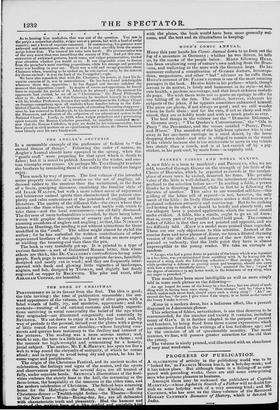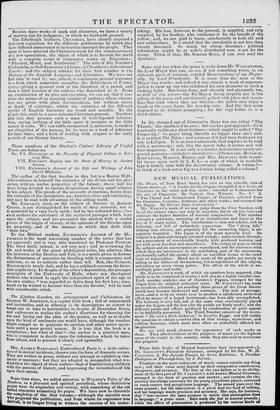PROGRESS OF PUBLICATION.
A SLACKENING of' activity in the publishing world was to be " looked for," as FRANCIS MOORE has it, in a holyday-week; and it has taken place. But although there is a falling-off as com- pared with preceding weeks, there are still some enterprizing men who postpone pleasure to business.
Amongst them may be reckoned the publishers of Captain MARRYAT,—whose Japhet in Search of a Father will no doubt fur- nish us some holyday work of a very amusing kind; and Mr. CHURTON, who has sent us the three volumes of the Reverend HOBART CAUNTER'S Romance of History, which is devoted to India.
Besides these works of mark and character, we have a variety of matters ripe for judgment; to which we forthwith proceed.
The Edinburgh brothers, CHAMBERS, have already acquired a first-rate reputation for the different publications by which they have diffused amusement or instruction amongst the people. They seem to have selected the Christmas-week for the commencement of a new speculation, the object of which is to furnish the world with a complete series of elementary works on Education- " Physical, Moral, and Intellectual." The title of this Teacher's Cvclopielia, or Self-Instructor's Library, is Chambers's Educational Course : and the subject selected for their first number is the History of the English Language and Literature. We have not bad time to read it; nor, indeed, is continuous perusal necessary to a book which somewhat resembles the Bibliotheca of FABRI- CIUS,—giving a general view of the literature of a period, and then a brief account of the authors who flourished in it. From an examination of its plan and execution, we can say that it con- tains the names of an amazing number of authors; whose charac- ters are given with plain discrimination, but without nicety or depth of criticism ; whilst the estimates of the dift'erent epochs of English literature are broad and sensible. To the people this must be a most welcome Christmas present. Nowhere else can they procure such a mass of well-digested infornia- tion, saying nothing of the little space it occupies or the little money it costs. We can safely recommend it, moreover, to readers not altogether of the masses, for its uses as a book of reference for later times, and a book of reading with respect to the early periods of our literary history.
Three numbers of the Student's Cabinet Library of Useful Tracts are before us.
No. VI. REYNOLDS on the Necessity of Physical Culture to Lite- rary Men. VII. EDWARD'S Inquiry into the State of Slavery in Ancient Greece.
VIII. EICIIIIORN'S Account of the Life and Writings of John David Michaelis.
The author of the first treatise in this list is a Boston M.D., who combines in himself the character of the divine and the phy- sician, with an undue proportion of the former ; above half his tract being devoted to various disquisitions having small relation to his subject. The proofs of the necessity of exercise, drawn from the rationale of the circulation, arc, however, clear and convincing, and may be read with advantage by the sitting world.
Mr. EDWARD'S tract, on the subject of Slavery in Ancient Greece, is not distinguished for much of deep research, nor is it animated by a very lively spirit ; but he has collected from clas- sical authors the substance of the scattered passages which bear upon the subject, and has presented the student with a useful precis of the origin of slavery, of the opinions of the Greeks upon its propriety, and of the manner in which they dealt with "their own."
To the Biblical student, Eicinioases Account of the MI- CHAELIS is the most interesting number of the series that has yet appeared; and is very ably translated by Professor PATTON. The tract itself, indeed, is not very new ; and in reviewing the life and works of the great philological critic, his admirer, like the historian of the Decline and Fall, is tco much given to destroy the distinctness of narrative by blending with it commentary and criticism, so as to indicate rather than tell. But, like GIBBON, EICHHORN is rarely dull, and he has a subdued sarcasm the histo- rian might envy. In despite of the editor's deprecation, the passages descriptive of the University of Halle, where any theological student who wished to apply the independent spirit of the age to his own studies " was regarded as fallen from his first love, inas- much as he wished to become wiser than his Savour," will be read with considerable relish.
The Kitchen Garden, its Arrangement and Cultivation, by GEORGE W. JOHNSON, is a capital little book ; full of amusement and instruction, and so alluring hi its descriptions as almost to tempt one to take to horticulture in despite of December frosts, and endeavour to realize the author's directions for choosing the site and laying out the plan of the garden, as well as to decide upon the kind of enclosure one would have, although the weather might compel us to postpone its erection and other active opera- tions until a more genial season. It is true that the book is a compilation ; but what of that ?—the author is a practical man, who is competent to decide upon the information which he takes from others, and to present it clearly and agreeably.
Mrs. ALFRED BARNARD'S Embroidered Facts is a little collec- tion of historical incidents, thrown into the form of dramatic scenes. They are written in prose, without any attempt at exhibiting cha- racter or manners; but they are adapted to accomplish what was doubtless the object of their author—that of familiarizing children with the persons of history, and impressing the vicissitudes of life upon their minds.
Some time since, we called attention to 'WILSON'S Tales of the Borders, as a pleasant and spirited periodical, whose distinctive points were its originality and variety, with something of the old ballad character animating its pages. We have now to chronicle the completion of the first volume,—although the amiable man v,_13o projected the publication, and from whom its cognomen was maned, is no longer living to witness the success of his under- taking. His loss, however, to the journal, is supplied, and ably supplied, by his brother, who continues it for the benefit of the widow; and, we are glad to learn, satisfactorily to both old an new subscribers. It is stated that the circulation is not less than twenty thousand. So much for cheap literature: political information might be as widely distributed were it not for the stamp. Think of that, Mr. SPRING RICE, if you ever read the Spectator.
Some wag has taken the pains to write down Mr. WINCHESTER;. the Lord Mayor that was, an ass, if not something worse, in an. elaborate piece of sarcasm, entitled Memorandums of my Mayor- alty, by Lord Winchester. It is more than the man or the Mayor was worth : and indeed it was almost a work of superero- gation to show up one who exhibited his own character in such a striking light. But being done, and cleverly and pleasantly too, as well as con amore—the Ex-Mayor being properly put in the pillory of the press, and satisfactorily pelted with jokes and inuen- does that stick where they are thrown—the public may enjoy a. laugh at the sorry figure his worship cuts. And this they seem disposed to do without prompting ; for the copy before us is a third edition.
In the stamped age of Almanacks there was one vclept "The Thumb," the smallest of its race : but one has just appeared—for it is actually visible at a short distance—which might be called "The Finger-tip ;" its pages being literally no bigger than one's nail.. It is entitled The Bijou ; and seems as if it had been fashioned for sale in Lilliput. It is an insect almanack, that requires to be read with a microscope; and, like the insect tribe, it invites and will bear inspection. It is not only a calendar, but contains neatly-en- graved portraits—minfature rniuiatures—oI ScrnLi.ER, BETZ SC 14 RAFFAELLE, MARTIN, BYRON, and Mrs. IIEMANS; with beauti- ful verses upon each by L. E. L.—a copy of which in readable type is luckily sent with the ducentesimo volume. A volume !— to think of a book not so big as a domino being called a volume!



























 Previous page
Previous page